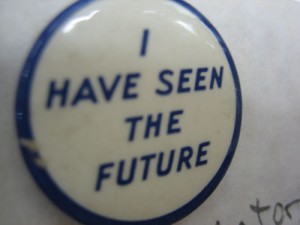What’s the science behind precognition?
In Larry Dossey’s book, The Power of Premontions, he points out that recent research shows that the hippocampus in the brain may be involved in premonitions. It makes sense. The hippocampus is the center of emotion, the autonomic nervous system, and memory.
Researchers at a neuroimaging center at University College London studied five patients with amnesia who had suffered brain infections that had damaged the hippocampus. They could recall the names of relatives, but not past events. When they and a control group were asked to visualize future scenarios, common events like visiting a beach or pub or meeting up with a friend and to describe what it would feel like, they couldn’t do it.
“The hippocampus-damaged subjects could not describe spatial relationships between objects that were part of the future scenario, and they said little about what they felt like, Dossey writes. “The discovery that the hippocampus is involved in visualizing the future may be important in understanding premonitions.”
This element may be key in understanding the science of precognition because people who experience them visualize possible future events. Dossey points out that a major difference is that the individual experiencing the premonition often experiences a certainty that the event will occur while the person who visualizes a future event considers it imaginary. “The brain may not respect this difference. It has a way of responding as if the imagined event is real.”
If, for instance, you’re lying in the dark and you’re the only person in the house and hear a noise that sounds like a door opening, like footsteps, it’s possible that you’re imagining it, but your brain doesn’t know that. It reacts as though the event is real and releases stress hormones that prepare you for the real thing.
Is the hippocampus in precognitives more active and ramped than the hippocampus in people who never feel premonitons?
Eleanor MacGuire, the same researcher who conducted the experiment with the amnesic patients, performed MRIs on sixteen London cab drivers and found that the rear region of their hoppocampuses were uniformly larger than that of the fifty individuals in the control group.
As Dossey explains, becoming a licensed cabbie in London isn’t easy. “Drivers have to learn ‘the knowledge,’ as it’s called, which includes up to twenty-five thousand street names and the locations of all the major tourist attractions. Cabbies must know not only how to get somewhere, but they must know the most direct route possible.” This “knowledge” usually takes three years of training. The longer a cabbie is on the job, the larger that region of the hippocampus became.
When the BBC News featured MacGuire’s discoveries, some cab drivers came forth and said their experiences as cab drivers made them better at everything from business decisions to mathematics. MacGuire is asgainst GPS devices in London cabs. “We believe this area of the brain increased…because of the huge amount of data they have to memorise. If they all start using GPS, that knowledge base will be less and possibly affect the brain changes we’re seeing.”
Dossey points out that GPS devices may not be the only premonition inhibitors in technology. Practically instantaneous information on everything from the weather to stocks to who will win the Super Bowl may inhibit our natural precog ability as well.
So what’s the solution? I, for one, don’t intend to unplug my iPhone, iPad or computer. But perhaps unplugging for brief periods every day and then spending a few minutes envisioning and visualizing the future on my own will help in the development of whatever precognitive ability I have.
HAPPY FOURTH OF JULY TO OUR AMERICAN FRIENDS!









Oh,
So it’s the “Knowledge” yer after? Well tis never a finer place to start then here
https://www.cabbieblog.com/tag/the-knowledge/
I have been following him for over a year now maybe two….
Laurence
Thanks for the link, Laurence! You always have interesting sources…and happy fourth to you, too.
Hey Trish, rob,
By now your fourth is nearly over, bu hey better late than never:
HAPPY FOURTH OF JULY !!!
Shine on you crazy diamonds….
Be well
Laurence
I remember reading a statistic that said the majority of Mensa members were cabdrivers at the time it didn’t really make sense to me I just thought they might of had a lot of time between fares to do crossword and sudoku puzzles happy July 4
Funny! I’d never heard that about Mensa people. My dad was a member – he was an accountant! Wish he were alive so I could ask him if he ever drove a cab!And happy 4th to you, too, Sharon!
I remember reading about those London Taxi Drivers a while back. I believe, most in depth learning will increase the hippocampus. But if ‘we’ continue to rely on computers etc surely there will be shrinkage. Mmmm, anyway, interesting post
I was going to ask you about those London cabbies!